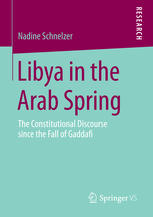

Most ebook files are in PDF format, so you can easily read them using various software such as Foxit Reader or directly on the Google Chrome browser.
Some ebook files are released by publishers in other formats such as .awz, .mobi, .epub, .fb2, etc. You may need to install specific software to read these formats on mobile/PC, such as Calibre.
Please read the tutorial at this link: https://ebookbell.com/faq
We offer FREE conversion to the popular formats you request; however, this may take some time. Therefore, right after payment, please email us, and we will try to provide the service as quickly as possible.
For some exceptional file formats or broken links (if any), please refrain from opening any disputes. Instead, email us first, and we will try to assist within a maximum of 6 hours.
EbookBell Team

4.8
84 reviewsThis book sketches the discourse about a new constitution in Libya since 2011. Applying a discourse analytical approach, the author identifies societal cleavages that have come to the fore in Libya’s transitional period. The debate has focused on democracy, federalism, decentralisation and localisation, the role of religion, women in politics as well as ethnic minorities. The strategies followed to ensure representation in the constitutional process have included civil disobedience, affirmative action and force. The effects of raising demands in these ways have been changes in the constitutional process and institutional design of Libya’s interim political institutions rather than promises that particular demands as to the content of the constitution would be met. The general prevention of a public discourse and competition along societal cleavages under Gaddafi’s totalitarian ideology has resulted in an all-out resurgence of splits along ethnic, regional and other lines.